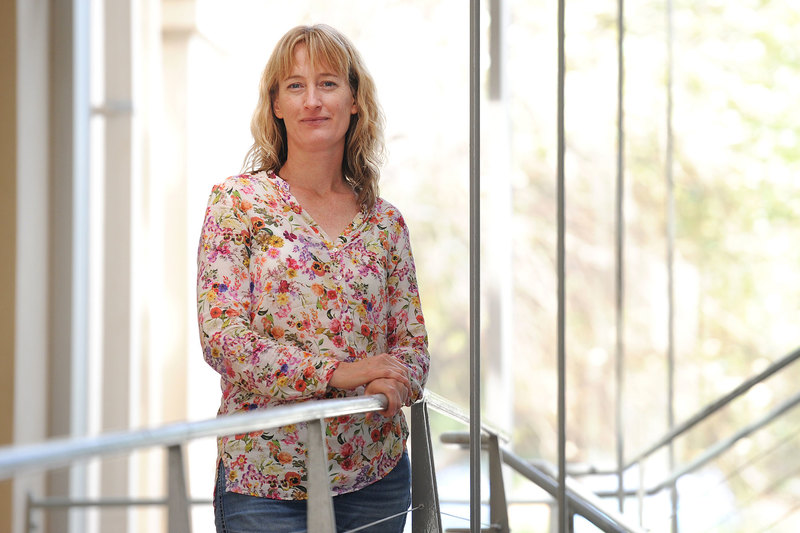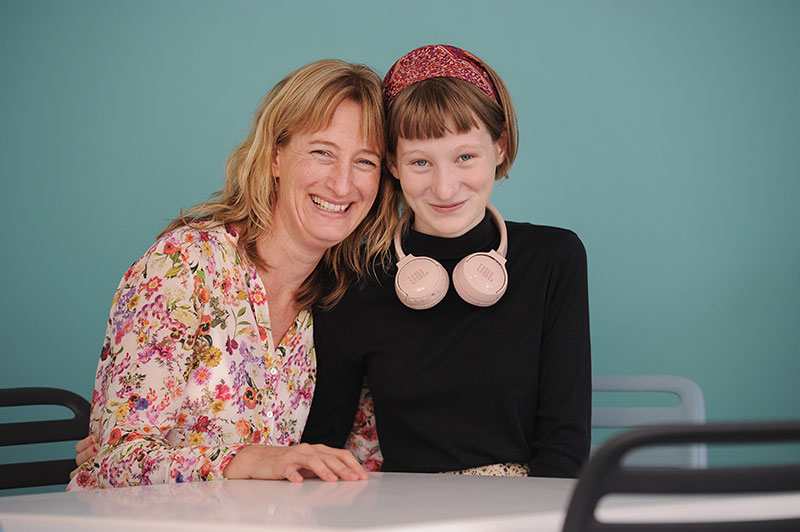Mom juggles challenges to thrive in disability studies
19 March 2020 | Story Kim Cloete. Photos Lerato Maduna. Read time 6 min.
A desire to learn more about disability in education inspired mother-of-four Sarah Oosthuizen to immerse herself in online courses and sign up for the University of Cape Town’s (UCT) Postgraduate Diploma in Disability Studies. The course introduced her to a new way of thinking and instilled in her a deep interest in the rights and education of the differently abled.
Sarah’s tight-knit family, where there is clearly plenty of love to go around, also inspired her to sign up for her studies. She has homeschooled her four children at different times over the years, including currently her 14-year-old daughter, Jessica, who lives with type 1 diabetes and her 12-year-old son, Kamva, who is HIV-positive and has learning challenges.
MOOCs as motivation
It was one of UCT’s massive open online courses (MOOC), “Education for All: Disability, Diversity and Inclusion”, that first drew her interest.
“It triggered something in me. It was so inspiring. I wanted to do more.”
She enrolled for two more MOOCs developed by UCT’s innovative Teacher Empowerment for Disability Inclusion project and then plunged into the Postgraduate Diploma in Disability Studies programme. One of its key goals is to help students to appreciate the shift in perspective from seeing disability as a welfare and charity issue to a human rights and development issue. This resonated with her.
The year-long programme consists of four courses, with two teaching blocks per year of two weeks each.
Inclusive and welcoming
Sarah described the first day of class as an eye-opener. “We might live with various challenges, but the nature of privilege means I have access to various solutions, more than other people. I was struck by the humility of people who live with significant challenges but were incredibly inclusive and welcoming.”
She said the group was a diverse blend of people ─ from professionals to newly graduated young students and students from different African countries.
“I found the [opportunity] to share in one another’s lives invaluable.”
Sarah said the lecturers also made a great effort to bring in speakers from outside the university, such as a pioneering principal of a school and a mother who is an ability activist, whose child lives with ability differences.
“She allows nothing to hold her back. It was so inspiring.”
“I was an old dog learning new tricks. I sorely lacked the tricks, but I loved it.”
Programme convener, Associate Professor Judith McKenzie, described Sarah as “an outstanding graduate who managed to juggle a lot of things” to complete her diploma and “has great ideas about where she wants to go from here”.
“Sarah demonstrated exceptional commitment and enthusiasm,” she said.
For Sarah, the year involved quite a few firsts. After a hiatus of 25 years, she was suddenly a student again, faced with the prospect of doing her first Power Point presentation and her first video conference.
“I was an old dog learning new tricks. I sorely lacked the tricks, but I loved it.”
Camaraderie at home
Her children also developed new respect for and pride in their mom.
“We’d pull up our chairs and work alongside each other. There was a lot of camaraderie in the house,” said Sarah.

Jessica, who is the epitome of gentleness and kindness, said she was extremely proud of her mother and had gained an insight into the life of a student by spending a day with her in class. The lecturers had welcomed Jessica with open arms, said Sarah. Kamva was also intrigued by this new chapter in his mother’s life.
Sarah said her husband, Barend, was very supportive and learnt how to cook to help accommodate her travelling from Stellenbosch for lectures, while daughter Emma, a third-year art student, and Rebekah, who is in matric, stepped in to help as well.
From theory to practice
The experience has encouraged Sarah to take her interest further.
“I’d like to take a MOOC and work through it together with teachers, facilitators, parents and people from different schools to discuss issues and find solutions and ways forward.” She also plans to do her masterʼs with a focus on disability in education.
Stigma, discrimination and a lack of understanding are still big obstacles in schools, and Sarah would like to see the narrative changed.
“Disability is another form of diversity. Every person, irrespective of abilities, has a voice that must be heard as much as anyone else.” she said.
She uses the term “disability” reluctantly and feels strongly that it should be changed. “It’s not right to be characterised as a ‘dis’.” She hopes this will be changed in time to a more empowering and respectful term.
“Disability is another form of diversity. Every person, irrespective of abilities, has a voice that must be heard.
Sarah said disability is hidden so people who haven’t been touched by it don’t necessarily feel the need to get involved. She hopes that change can be sparked on campus.
“I agree with the goal of the Disability Studies department to reach every part of campus. For someone with a physical disability, something like installing a wheelchair ramp is not enough. We need to learn more and do more. Everybody should do some form of disability studies course within their studies. It would help to create many more compassionate students, academics and professionals one day.”
While graduation ceremonies have been postponed due to the coronavirus pandemic, Sarah said she completely understands and supports the decision.
“I’m grateful that UCT has adopted strict measures like postponing or cancelling events like graduation. Pre-emptive measures are more important than events. My greatest hope for this time is that we do not lose our humanity in our worry. Itʼs time to be all the more inclusive in our care.”
 This work is licensed under a Creative Commons Attribution-NoDerivatives 4.0 International License.
This work is licensed under a Creative Commons Attribution-NoDerivatives 4.0 International License.
Please view the republishing articles page for more information.
Graduation March 2020
We understand the disappointment that our students and their families feel about the suspension of the March 2020 graduation ceremonies. Please know that the decision to suspend the ceremonies was not taken lightly. We congratulate the March 2020 qualifiers on their academic success. All graduands will graduate in absentia, with a confer date of 19 March 2020. Graduation certificates will be issued to qualifiers and the Registrar has communicated directly with all qualifiers about the arrangements for the issue of graduation certificates and transcripts.
Find full information, including Frequently Asked Questions, on the Graduation page on the Students website.
Our stories: inspirational graduates
Although UCT has suspended the March graduation season because of concerns about the spread of Covid-19, the news team would nonetheless like to honour those who would have been capped. We have chosen to profile a cross-section of inspirational graduands whose stories we’d like to share. To all those we haven’t been able to feature, we’d like to say: each one of you is an inspiration – to your university, your families and your communities. Stay healthy.





















